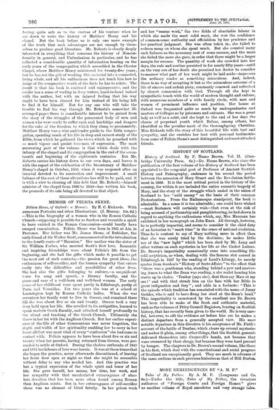MEMOIR OF FELICIA. SKENE.
Felicia Slane, of Oxford : a Memoir. By E. C. Rickards. With numerous Portraits and other Illustrations. (J. Murray. 10s. 6d.) —This is the biography of a woman who in the Roman Catholic Church—supposing it possible for so fearless and versatile a spirit to have existed in the Roman Communion—could hardly have escaped canonisation. Felicia Skene was born in 1821 at Aix, in Provence. Her father was Mr. James Skene, of Rubislaw, tho early friend of Sir Walter Scott, commemorated in the introduction to the fourth canto of " Marmion." Her mother was the sister of Sir William Forbes, who married Scott's first love. Romantic and inspiring friendships were about Felicia's life from the beginning, and she had the gifts which make it possible to get the most out of such contacts,—the passion for great ideas, the enthusiasm of self-sacrifice, and the human sympathy that enters easily into tho difficulties and possibilities of other lives. She had also the gifts belonging to culture,—a magnificent voice for song and speech, a literary faculty, and the grace and ease of a well-born and well-bred woman. The early years of her childhood were spent partly in Edinburgh, partly at Paris and Versailles. For two years she was at a school at Leamington kept by Roman Catholic ladies. When sho was seventeen her family went to live in Greece, and remained there till she was about five or six and twenty. Greece took a very deep hold upon her life. She revelled in its antiquities, learned to speak modern Greek fluently, and attached herself profoundly to the ritual and teaching of the Greek Church. Ultimately she threw in her lot with the Anglican Church. But her earlier experi- ence of the life of other Communions was never forgotten, the depth and width of her spirituality enabling her to carry in her heart all that was most vital of every "confession" she had come in contact with. Felicia appears to have been about five or six and twenty when her parents, having returned from Greece, were per- suaded to settle at Oxford. During the cholera outbreaks of 1849 and 1854 her labours of love were heroic. It was at these times that she began the practice, never afterwards discontinued, of leaving her front door open at night so that she might be accessible without delay to any who needed her. And this practice was but a typical expression of the whole spirit and tenor of her life. She gave herself, her means, her time, her work, and her sympathy with that uncalculated extravagance of abso- lute devotion that has been more often found among Roman than Anglican saints. But in her extravagance of self-sacrifice there was no element of blind fatuity. In her prison work
and her "rescue work," the two fields of charitable labour in which she made the most solid mark, she won the confidence of common-sense authority and officialdom by her prudence and her practical judgment. She was often taken in ; she failed to redeem many on whom she spent much. But she counted many such failures as the necessary cost of some success, and the more she failed the more she gave, in order that there might be a larger margin for success. The quantity of work she crowded into her days, the rule and routine persisted in for nearly fifty years—until on the very eve of her death she promised her doctor to consider to-morrow what part of her work might be laid aside—impresses the ordinary reader as something miraculous. And, indeed, there is no way of accepting it but as the miraculous outcome of a life of sincere and ardent piety, constantly renewed and refreshed by closest communion with God. Through all she kept in sympathetic touch with the world of modern thought and culture, with numerous members of a wide family circle, with men and women of prominent influence and position. Her house at Oxford was frequented quite as much by undergraduates and masters of Colleges as by prisoners and outcasts. She was a great lady as well as a saint, and she kept to the end of her days the charm of perpetual youth which Balzac, among others, has identified as the peculiar mark of the thoroughgoing Christian. Miss Rickards tells the story of this beautiful life with tact and sympathy, and she enriches her text with personal testimonies from some of Felicia Skene's most distinguished and most attached friends.


















































 Previous page
Previous page